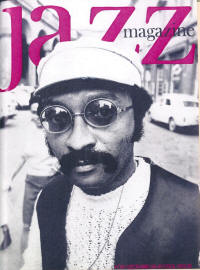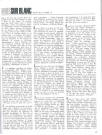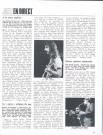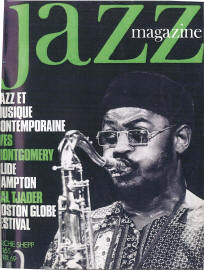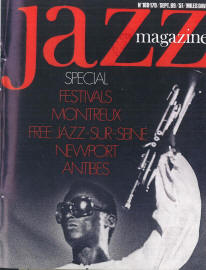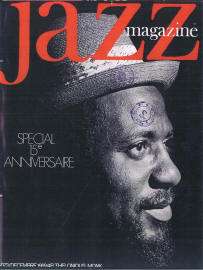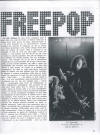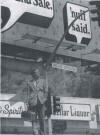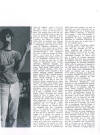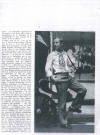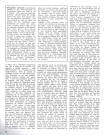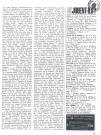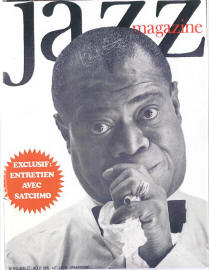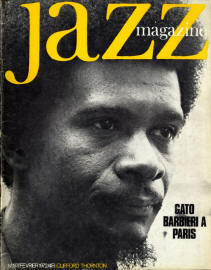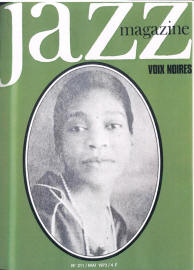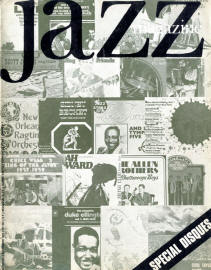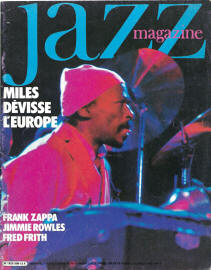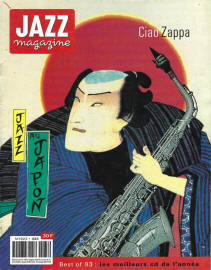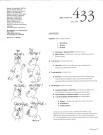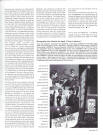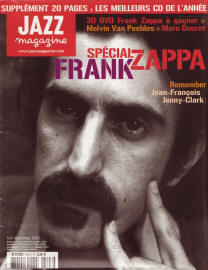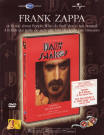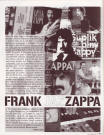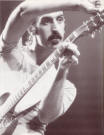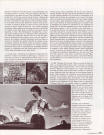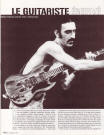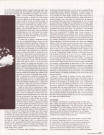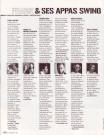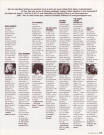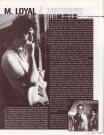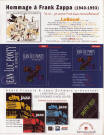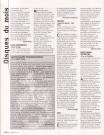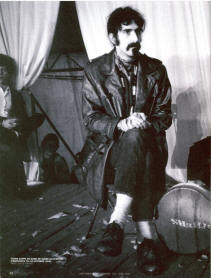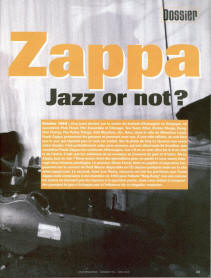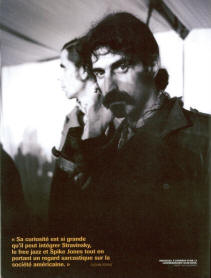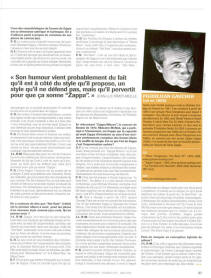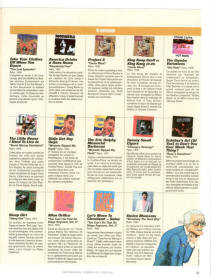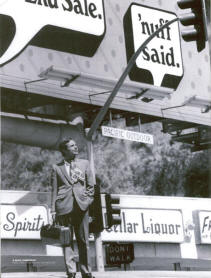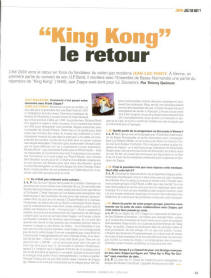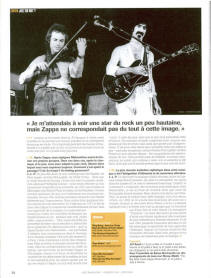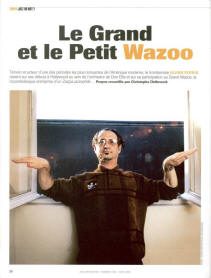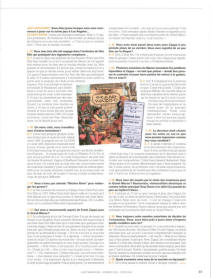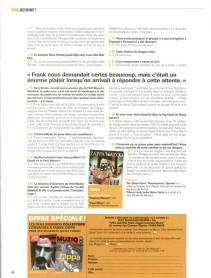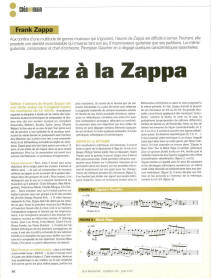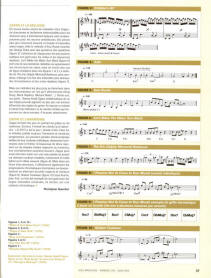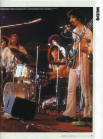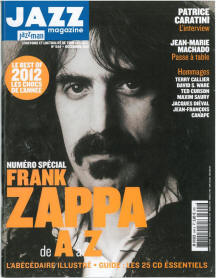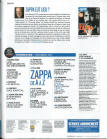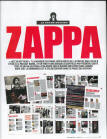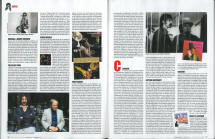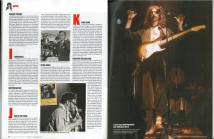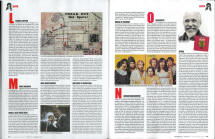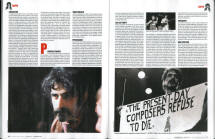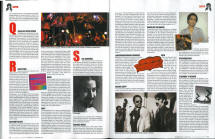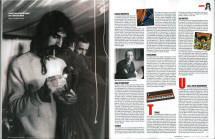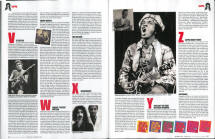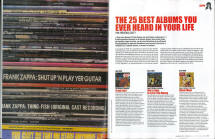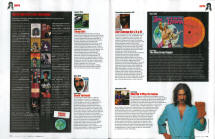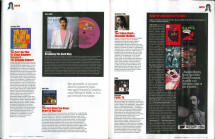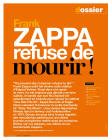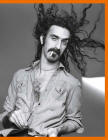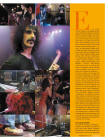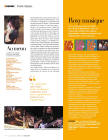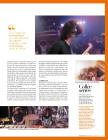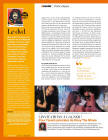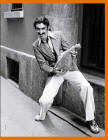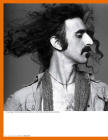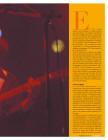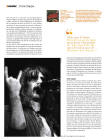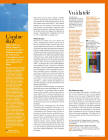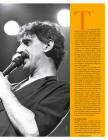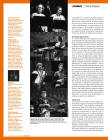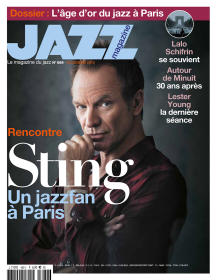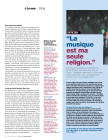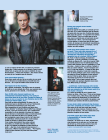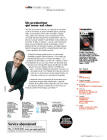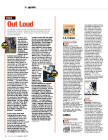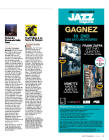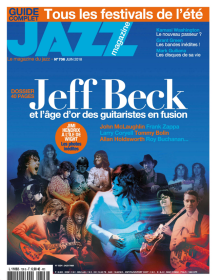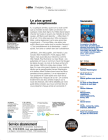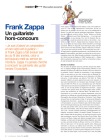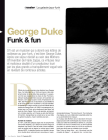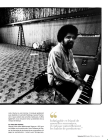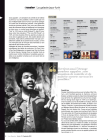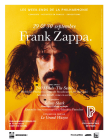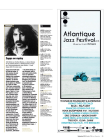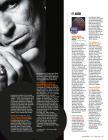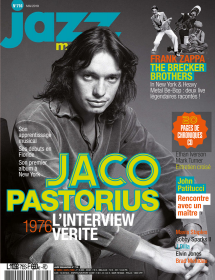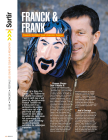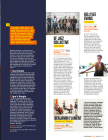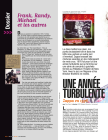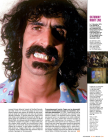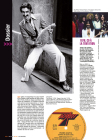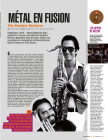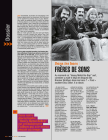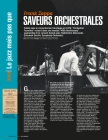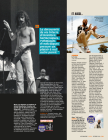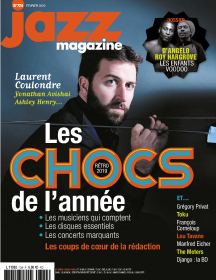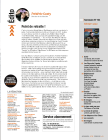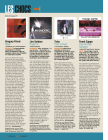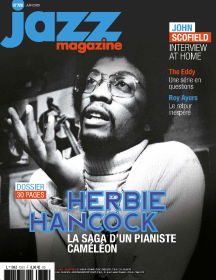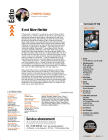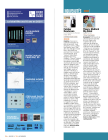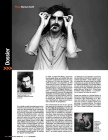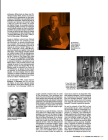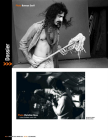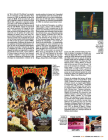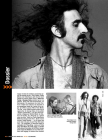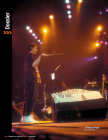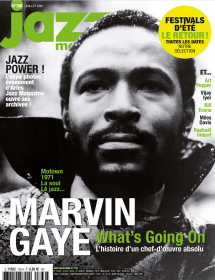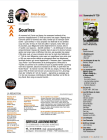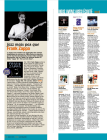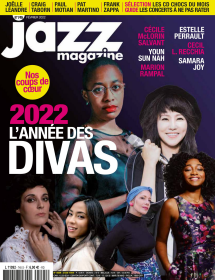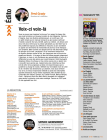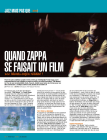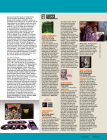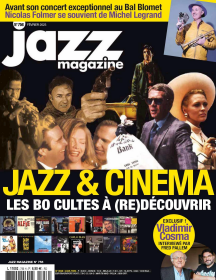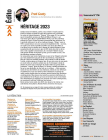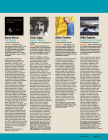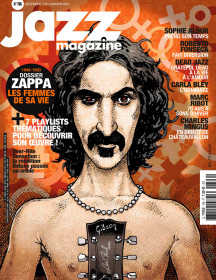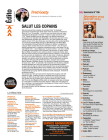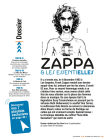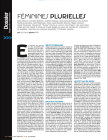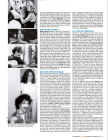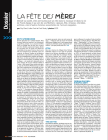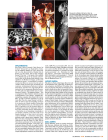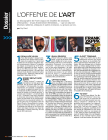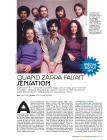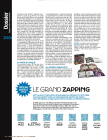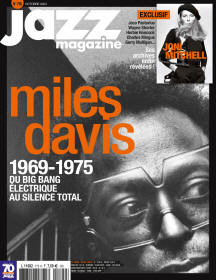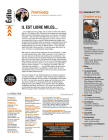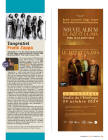Jazz Magazine
In 2009 merged with Jazzman.
From May 2003 until October 2004, when magazine Muziq started, Jazz Magazine issues had 4- or 8-page rock-oriented supplements called Tangentiel. Jazz Magazine is quarterly issuing special editions ("hors série"), which mostly have Muziq logo.
The Real Frank Zappa Book, p 106: "The
first time we played with Rahsaan Roland Kirk was at the 1968
Boston Globe Jazz Festival. After his performance,
when introduced to him backstage, I said I really liked what
he was doing, and said that if he felt like joining us onstage
during our set, he was more than welcome. In spite of his blindness,
I believed we could accommodate whatever he wanted to do. We
began our set, wending our atonal way toward a medley of 1950s-style
honking saxophone numbers. During this fairly complicated, choreographed
routine, Rahsaan, assisted by his helper (can't remember
his name), decided to join in."
On page 21 is a picture of FZ, Roy Estrada, Rahsaan Roland Kirk
and his helper (Kirk Quartet's drummer Jimmy Hoppes?) on
stage. [C. Ulrich : "It was percussionist Joe “Habao” Texidor.
See
Bright Moments, p. 228"]

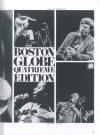


Source: Javier Marcote
On the Newport Jazz Festival FZ and MOI played
on Saturday morning, July 5th. Before that in June they participated
in a jazz tour.
The Real Frank Zappa Book, pp 106-107 : "In 1969,
George Wein, impresario of the Newport Jazz Festival, decided
it would be a tremendous idea to put the Mothers of Invention
on a jazz tour of the East Coast. We wound up working in a package
with Kirk, Duke Ellington and Gary Burton in Miami at the Jai
Alai Fronton, and at another gig in South Carolina.
[...]
Before we went on, I saw Duke Ellington begging – pleading –
for a ten-dollar advance. It was really depressing. After that
show, I told the guys: 'That's it -- we're breaking
the bande up.'"


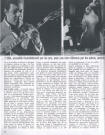
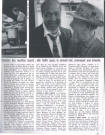
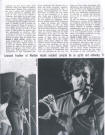
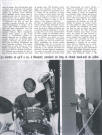
Source: Javier Marcote
Zappa (g. b), George
Duke (p, org, tb), Ian Underwood (p, org, instruments à vents
divers), Martin Lickert (b), Aynsley Dunbar, Ruth Underwood
(dm), Mark Volman, Howard Kaylan (voc + « special material »),
Jim Pons (voc) + The Royal Philharmonie Orchestra (leader :
Elgar Howarth). United Artists Uas 29 218-219 / 2x30 cm / 33
t.
![]() Tas
de Polichinelles, je vais vous confier un secret de Polichinelle
: le mec Zappa est un sacré Polichinelle ! C'est comme pour
Fu-Manchu et le S.d.e.c.e : le monde entendra encore parler
de lui ! Je suis bien sûr qu'il y a déjà des types qui liment
des formules sous la lampe, pour les anthologies futures, du
genre « le Groucho Marx de la musique vingtiémiste » ou « le
Wagner du Dérisoire ». Remarquez qu'ils ne grattent pas en vain,
les misérables : il y a des tas de disques pour prouver qu'ils
ne racontent pas tout à fait n'importe quoi. Et entre autres
ces deux-là, qui en fait de délire et de dérision, n'y vont
pas avec le dos de la truelle. On a rarement déconné avec autant
de largesse et de somptuosité. Cela dit, il faut bien reconnaître
que 200 Motels n'a guère d'intérêt que si on cause parfaitement
l'anglais... C'est merveilleux, le sarcasme et la parodie. Mais
en étranger sur quatre faces de trente-centimètres avec pas
toujours beaucoup de musique autour (et surtout quand on n'a
pas vu le film) ça fait un peu léger-léger ! En revanche, on
vous file avec les disques une affiche qui est assez marrante.
Tas
de Polichinelles, je vais vous confier un secret de Polichinelle
: le mec Zappa est un sacré Polichinelle ! C'est comme pour
Fu-Manchu et le S.d.e.c.e : le monde entendra encore parler
de lui ! Je suis bien sûr qu'il y a déjà des types qui liment
des formules sous la lampe, pour les anthologies futures, du
genre « le Groucho Marx de la musique vingtiémiste » ou « le
Wagner du Dérisoire ». Remarquez qu'ils ne grattent pas en vain,
les misérables : il y a des tas de disques pour prouver qu'ils
ne racontent pas tout à fait n'importe quoi. Et entre autres
ces deux-là, qui en fait de délire et de dérision, n'y vont
pas avec le dos de la truelle. On a rarement déconné avec autant
de largesse et de somptuosité. Cela dit, il faut bien reconnaître
que 200 Motels n'a guère d'intérêt que si on cause parfaitement
l'anglais... C'est merveilleux, le sarcasme et la parodie. Mais
en étranger sur quatre faces de trente-centimètres avec pas
toujours beaucoup de musique autour (et surtout quand on n'a
pas vu le film) ça fait un peu léger-léger ! En revanche, on
vous file avec les disques une affiche qui est assez marrante.
Automatic translation: Bunch of Polichinelles, I'm going to
tell you an Open secret: the Zappa guy is a hell of a Punch!
It's like Fu-Manchu and the S.d.e.c.e: the world will still
hear about him! I am sure that there are already types who fire
up formulas under the lamp, for future anthologies, of the genre
"the Groucho Marx of twenty-century music" or "the Wagner of
the Derisory". Notice that they don't scratch in vain, the miserable
ones: there are piles of records to prove that they do not tell
just rubbish. And among other things these two, who in fact
of delirium and derision, do not go with the back of the trowel.
We have rarely messed around with so much generosity and sumptuousness.
Having said that, we have to admit that 200 Motels is of little
interest if we talk perfectly about English ... It's marvelous,
the sarcasm and the parody. But as a foreigner on four thirty-centimeter
sides with not always a lot of music around (and especially
when you haven't seen the film) it's a little light-hearted!
On the other hand, we give you a poster with the discs which
is quite funny.
Source: Fulvio Fiore
 Mothers
of Invention : Frank Zappa (voc, g, perc), George Duke (claviers),
Bruce Fowler (tb), lan Underwood (cl, as, fi), Ruth Under Wood
(vib, marimba), Ralph Humphrey (dm) + Jean-Luc Ponty (vln).
Hollywood Palladium, Los Angeles, 27 mars.
Mothers
of Invention : Frank Zappa (voc, g, perc), George Duke (claviers),
Bruce Fowler (tb), lan Underwood (cl, as, fi), Ruth Under Wood
(vib, marimba), Ralph Humphrey (dm) + Jean-Luc Ponty (vln).
Hollywood Palladium, Los Angeles, 27 mars.
A l'entrée, un panneau : « Ne fumez pas... de pot, s'il vous
plait ». Dans la salle, on s'aperçoit qu'il serait préférable
d'interdire, aussi, de respirer... La densité de gens, de fumée,
de bruits et de musique est telle qu'il est difficile de rendre
compte avec précision de ce qui se passe sur l'estrade visuellement
et musicalement. Après m'être promené dans la foule pendant
près de deux heures, j'ai pu constater en tout cas que le nouveau
spectacle de Zappa accorde beaucoup moins d'importance au gag
et aux effets de « bizarre », au profit d'un travail
strictement musical (mélanges de musique « contemporaine »,
de rock et, pour une large part, de jazz). Outre Ponty, on découvre
parmi les nouveaux venus un ex-trombone de Woody Herman (Fowler),
un ex-batteur du big band de Don Ellis (Humphrey). Au premier
plan sonore : les compagnons habituels de Zappa, responsables
de passages collectifs toujours aussi précis et complexes. Mais
dans l'ensemble tout se passe comme si les musiciens de Zappa
cherchaient à « accrocher> le public plutôt qu'à créer quelque
chose de décisif. Fowler et Duke, notamment, se conduisent surtout
en showmen. Quant à Ponty, s'il fut à certains moments extrêmement
brillant et impressionnant, il se laissa aller le plus souvent
à une sorte de tempo « country and western ». A noter aussi
: un long duo mélodramatique timbales - batterie par Zappa et
Humphrey... De toute façon, et quelle que soit la valeur musicale
des nouveaux «Mothers», c'est en d'autres lieux, plus propices
à l'audition, que l'on aurait aimé entendre Zappa et Ponty.
Souhaitons que le disque (ce « concert > fut enregistré)
nous permette d'apprécier ce groupe dans de meilleures conditions.
Automatic translation: At the entrance, a sign: "Do not smoke
... pot, please". In the room, we realize that it would be preferable
to prohibit, too, breathing ... The density of people, smoke,
noise and music is such that it is difficult to accurately account
for what is happening on the stage visually and musically. After
walking around the crowd for nearly two hours, I could see in
any case that the new show of Zappa gives much less importance
to the gag and the effects of "weird", in favor of a job. strictly
musical (mixtures of "contemporary" music, rock and, to a large
extent, jazz). Besides Ponty, we discover among the newcomers
an ex-trombone of Woody Herman (Fowler), a former drummer of
the big band of Don Ellis (Humphrey). In the foreground: Zappa's
usual companions, responsible for collective passages that are
always so precise and complex. But on the whole everything happens
as if the musicians of Zappa were trying to "hook" the audience
rather than create something decisive. Fowler and Duke, in particular,
behave mainly as showmen. As for Ponty, if he was at times extremely
brilliant and impressive, he usually indulged in a sort of "country
and western" tempo. Also note: a long melodramatic timpani -
drums duo by Zappa and Humphrey ... Anyway, and whatever the
musical value of the new "Mothers", it is in other places, more
conducive to hearing , which we would have liked to hear from
Zappa and Ponty. Let us hope that the disc (this "concert" was
recorded) will allow us to appreciate this group in better conditions.
Source: Javier Marcote, Fulvio Fiore
![]() The
Mothers of Invention Zappa (g, voc), Ruth Underwood (perc),
Tom Fowler (b), George Duke (claviers, voc), Chester Thompson
(dm), Napoleon Murphy Brock (ts, fi, voc). Paris, Palais des
Sports, 27 septembre.
The
Mothers of Invention Zappa (g, voc), Ruth Underwood (perc),
Tom Fowler (b), George Duke (claviers, voc), Chester Thompson
(dm), Napoleon Murphy Brock (ts, fi, voc). Paris, Palais des
Sports, 27 septembre.
D 'abord le rite désormais classique du réglage de la sono,
équilibre, filtrage, branchement de la table de mixage géante,
un retour en coulisse le temps que les lumières soient prêtes
et c'est parti... On assiste alors au cours d'une sorte de show
anti-show de deux heures sans arrêt à un prodigieux nettoyage
de tous les faux-semblants et autres mythologies hypnotisantes
qui constituent le fond du show traditionnel. De la grosse farce
le pianiste George Duke s'absentant par deux fois pour « aller
faire pipi » à des moments supposés cruciaux, cassant ainsi
la mécanique du concert jusqu'aux parodies plus vraies que nature
de la soul music (Have you got a soul ?) ou de la romance
amoureuse pour juke-box (We could share our love),
tout est mis en ouvre, à tous les niveaux, pour désamorcer et
évacuer les sortilèges fascinants de la machinerie habituelle.
La dérision féroce et terriblement joyeuse de Zappa est d'autant
plus saisissante qu'elle s'exerce à partir des vertus mêmes
requises dans la forme de spectacle dénoncée mise en place,
qualités techniques, virtuosité. A partir des loques et débris
des « objets culturels » donnés à la consommation des « jeunes
» par l'industrie du divertissement, Zappa reconstruit un spectacle
libéré des tabous et servitudes abrutissantes dans un énorme
éclat de rire.
Automatic translation: First of all the now classic rite of
sound adjustment, balance, filtering, connection of the giant
mixer, a backstage return while the lights are ready and off
we go ... 'a kind of non-stop two-hour anti-show show with a
prodigious cleansing of all the pretenses and other hypnotizing
mythologies that constitute the basis of the traditional show.
From the big farce, the pianist George Duke being absent twice
to "go pee" at supposedly crucial moments, thus breaking the
mechanics of the concert to the larger-than-life parodies of
soul music (Have you got a soul ?) or romance for jukeboxes
(We could share our love), everything is done, at all
levels, to defuse and evacuate the fascinating spells of the
usual machinery. Zappa's fierce and terribly joyful mockery
is all the more striking in that it is exercised from the very
virtues required in the form of the denounced spectacle set
up, technical qualities, virtuosity. From the rags and debris
of "cultural objects" given to the consumption of "young people"
by the entertainment industry, Zappa reconstructs a show freed
from taboos and brutalizing servitudes in a huge burst of laughter.
Source: Fulvio Fiore
1982 June
No. 308
Mais
qui sont ces jazzmen qui soufflent pour Zappa?
(But who are these jazzmen who blow for Zappa?)
By Francis Vincent, pp 26-27
Automatic translation:
Frank Zappa has always said that he has little taste for anything
related to jazz. It is however clear that Wes Montgomery and
Eric Dolphy, for example, were important landmarks in his personal
journey; we also know that youth was rocked by blues and rhythm
and blues – from Guitar Slim and Elmore James to Johnny Guitar
Watson. But in various interviews the father of the Mothers
explained that he had "got angry" with jazz very early on: and
at the time, Howard Rumsey and his Lighthouse All Star represented
for him the height of sham... (read
more)



2003 December
No. 543
Dossier Frank Jazzappa, pp 15-26
Comme une odeur de jazz
Guy Darol
Le Guitariste nerv
Pierrejean Gaucher
Les M.O.I., l'moi et moi
Jean-Jacques Birg
Frank et ses appas swing
Christophe Delbrouk
M. Loyal à Amougies
Philippe Thieyre
Après 68 (postscriptum)
Philippe Carles
2008 June
No. 593
Dossier Zappa Jazz or not?, 18 pp
Un rockeur qui fait jaser
Roundtable (Glenn Ferris, Christophe Delbrouk, Pierrejean
Gaucher, Jean-Luc Rimey-Meille) by Guy Darol
Faire un bruit jass là
Guy Darol
"King Kong" le retour
Jean-Luc Ponty interview by Thierry Quénum
Le Grand et le petit Wazoo
Glenn Ferris interview by Christophe Delbrouk
Jazz à la Zappa
Pierrejean Gaucher
2012 December
No. 644
Le grand dossier Zappa, 35 pp
Le Zappabécédaire
By Guy Darol, pp 28-47
Frankly Speaking
Quotes of other musicians on Frank Zappa, pp 48-49
The 25 Best Albums You Ever Heard In Your Life
By Frédéric Goaty, pp 50-53, 56-61
1940-1993: Hot Dates
pp 54-55
2015 October
No. 677
Dossier
Frank Zappa refuse de mourir! pp 12-33
Roxy le film
Bebop, tango et pingouins
By Frédéric Goaty, pp 14-18
Le portfolio
pp 20-23
One Size Fits All
Taille unique, plaisirs pluriels
pp 24-27
La tournée 1988
Zappa n campagne
By Guy Darol, pp 28-33
2016 November
No. 689
Sting: “La musique est ma seule
religion.”
By Ed Motta, pp 10-11
Frank Zappa par Guy Darol
By Frédéric Goaty, p 63
2018 September
No. 709
George Duke: Funk & fun
By Jean-Pierre Vidal, pp 36-38
Frank Zappa en replay
By Guy Darol, p 95
2019 May
No. 716
Franck & Frank
By Franck Tortiller, pp 4-5
Dossier: Frank Zappa Les Brecker Brothers
By Guy Darol, Julien Ferté, Frédéric Goaty, Doc Sillon,
pp 39-42, 45-50
2021 July
No. 739
Jazz mais pas que Frank Zappa (Zappa
'88 : The Last U.S. Show)
By Julien Ferté, p 78
2022 February
No. 745
Quand Zappa se faisat un film.
200 Motels enfin réédité!
By Peter Cato, pp 70-71
2023 December
No. 766
Dossier Frank Zappa
By Guy Darol with Julien Ferté and Fred Goaty, pp 39-46
Féminins plurielles (Plural feminine)
La fête des mères (Mothers ay)
L'offense de l'art (The offense of art)
Quand Zappa faisait sensation (When Zappa was
a sensation)
2024 October
No. 775
Tangentiel Frank Zappa. (Apostrophe
(') 50th Anniversary Edition)
By Fred Goaty, p 55
